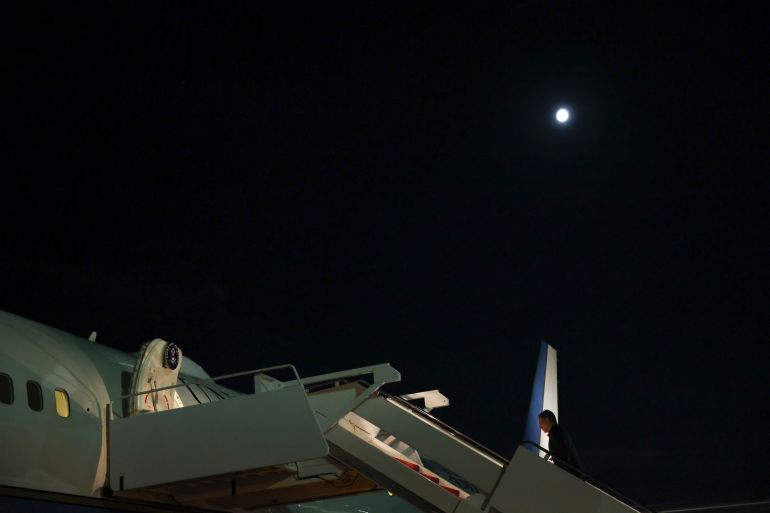Top US diplomat Blinken visiting Israel as Gaza truce efforts set to resume
US, Qatar, Egypt are mediating to secure a ceasefire and captive swap deal as the death toll in Gaza rises to more than 40,000.
US Secretary of State Antony Blinken boards a plane at Joint Base Andrews in Maryland to depart to the Middle East on August 17, 2024 [Kevin Mohatt/Pool via AFP]Published On 18 Aug 202418 Aug 2024
The United States’s top diplomat is visiting Israel as part of Washington’s efforts to secure a ceasefire in Israel’s war on Gaza in which more than 40,000 Palestinians have been killed in the besieged enclave since last October.
Secretary of State Antony Blinken was set to arrive in Israel on Sunday, days after the US put forward proposals that it and mediators Qatar and Egypt believe would close gaps between Israel and Hamas. Truce talks are expected to resume in Cairo in the coming days after two days of negotiations in Doha this week.
Keep reading
list of 3 itemsend of list
Mediators have said they presented a bridging ceasefire proposal to both sides and that negotiations were making progress, but they also cautioned that there is still work to be done.
In Israel, Blinken is expected to meet Israeli Prime Minister Benjamin Netanyahu and other senior officials.
Israel’s negotiating team on Saturday expressed “cautious optimism” on the possibility of advancing a deal, according to a statement from Netanyahu’s office.
However, Hamas has called for a ceasefire plan outlined by Biden in late May to be implemented instead of something that introduces “new conditions” from Israel.
Hamas official Osama Hamdan told Al Jazeera that Netanyahu remains the main obstacle to a ceasefire and an exchange deal for the remaining captives and Palestinian prisoners.
“From day one, we said we will not accept a temporary arrangement, it was done in November 2023, and the Israelis undermined that,” Hamdan said.
“So we want a full arrangement … including a ceasefire and an Israeli withdrawal from all parts of Gaza,” he said.
Regional tensions
“Hamas has learned from the past that every time they were closer to a deal and everyone would think it was within reach, the Israelis would do something different, like committing atrocities, targeting or assassinating a leader,” Hassan Harari, a professor of international affairs at Qatar University, told Al Jazeera.
Among the sticking points are conditions that Israel added since the United Nations Security Council adopted a resolution on the proposal outlined in May – including continued Israeli presence on the Philadelphi Corridor separating the Egyptian region of Sinai from the Gaza Strip, and the establishment of checkpoints to monitor the movement of people from south to north.
“Netanyahu is procrastinating to make it tough for Hamas to agree,” Harari said. “But also from the Israeli perspective, there are some circles who believe these demands are legitimate.”
The discussions will also include the list of captives’ names to be released in Gaza, the list of Palestinian prisoners to be freed, and the schedule for their release.
“No doubt [Blinken’s] largest challenge is likely to be to convince the top level of the Israeli government, Netanyahu in particular, to be more flexible with regards to their demands when it comes to this deal,” said Al Jazeera’s Zein Basravi.
“There is a great deal of negativity from a number of experts, from people here on the ground with regards to the success of this deal, because they say what the US and Israel are doing is creating a sense of cautious optimism while shifting the goalpost and shifting the blame on Hamas for not agreeing to a deal,” Basravi added, reporting from Amman, Jordan due to Israel’s ban on Al Jazeera.
Hamas as well as some analysts and Israeli protesters have accused Netanyahu of hamstringing a deal to safeguard his hard-right ruling coalition.
“We have a prime minister that is not so much willing to release the hostages, to finish the war, because he has he own interests,” Yossi, a 53-year-old protester in Tel Aviv, told the AFP news agency.
Negotiations are unfolding under the threat of a regional escalation, with Iran pledging to retaliate against Israel following the assassination of Hamas leader Ismail Haniyeh in Tehran on July 31.
Meanwhile, in Gaza, Israel’s deadly attacks continue, with nearly two dozen people killed overnight and into Sunday – including a family of eight. This week, the death toll from Israel’s bombardment in the Gaza Strip reached 40,000, according to Palestinian health authorities.
